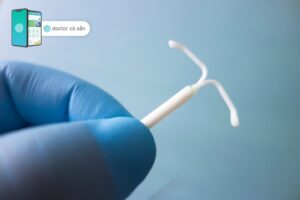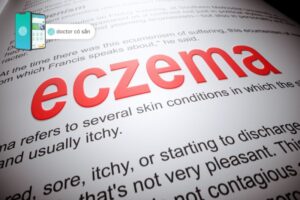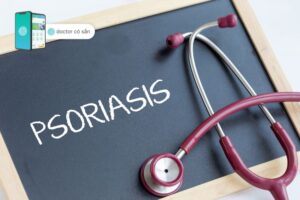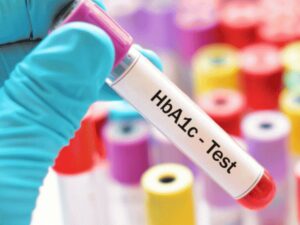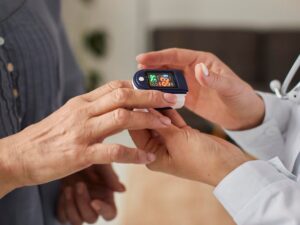HIV can affect anyone, and symptoms vary from person to person. In particular, HIV symptoms in women are often slightly different from those in men. In the Docosan article below , we describe HIV symptoms in women and the treatment options available.
Tóm tắt nội dung
HIV test at home with rapid test kit
Docosan provides a solution for rapid HIV testing at home with a product set that has been retested by the Ministry of Health for quality and safety. With this home HIV/Syphilis Test kit, you can not only find out if you are infected with HIV but also detect syphilis – a dangerous sexually transmitted disease.
The results are quick, taking just 15 minutes, and the process is simple and not too fussy. Moreover, you will be supported to connect with a specialist when you test positive for HIV or syphilis. Your doctor will advise you on what to do to control the disease.

HIV symptoms in women at each stage
HIV symptoms in women are expressed through each stage with the following typical symptoms:
Stage 1: Acute infection
Early signs of HIV in women are usually detected 2 to 4 weeks after HIV infection and are the most contagious time. At this point, the body is reacting to the virus, which often leads to flu-like symptoms.
In some cases, the symptoms are so mild that you may not even notice them. But others may need to be seen by a doctor or other health care professional. Here are some possible symptoms during the acute phase:
Swollen, swollen or inflamed lymph nodes
Swollen lymph nodes or glands are often one of the first signs of HIV and can last for several months. Lymph nodes are located throughout the body, including:
- Neck
- Nape
- Armpit
- Crotch

When HIV begins to spread in the body, the immune system kicks in. The result is inflamed or swollen lymph nodes.
Sore throat
A sore throat is a fairly common symptom in the early stages of HIV infection. It can last days, weeks, or even months in rarer cases.
Mouth sores
Mouth sores can also occur in the early stages and can even be the first sign of an infection. But they can also occur when HIV has progressed to a later stage. They can appear on the tongue, roof of the mouth, or lips. Others may have painful red sores on the inside of their cheeks and lips.

Dermatitis – HIV symptoms in women
Most people with HIV develop skin diseases. Rash is a common female HIV manifestation. However, they can be a symptom of HIV itself or the result of a concurrent condition or infection.
Night sweats
Some people may experience night sweats for the first month after contracting HIV. They occur when the body tries to fight an infection during sleep. Other symptoms, such as fever and night sweats, are common.
Muscle aches
One of the most frustrating symptoms for people with HIV is that muscle mass can begin to ache in the first few weeks after infection. This is usually the result of a flu-like episode.

Other flu-like symptoms
Some people may have other flu-like symptoms, including:
Headache
- Tired
- Chills
These symptoms usually go away within a few weeks.
HIV manifestations in women stage 2: Chronic infection
Chronic HIV infection, also known as the asymptomatic phase, is the point at which the virus remains at low levels inside the body. While some people do not experience any symptoms during this stage, the virus is still active and can continue to grow for several years.
For others, symptoms may become more severe than during the acute phase, and can include cough, fatigue, weight loss, and diarrhea. In some cases, individuals may experience high fever as well. If you suspect that you may have been exposed to HIV or are experiencing any unusual symptoms, it’s important to speak with a doctor or other healthcare professional for evaluation and testing.

Stage 3: Acquired immunodeficiency syndrome (AIDS)
This is the most severe stage of HIV, the body’s immune system has been severely weakened. It becomes more difficult to prevent certain infections, called opportunistic infections, or diseases.
Infections and diseases
HIV makes it easier for opportunistic infections to continue. Some of these include:
- Pneumonia
- Tuberculosis
- Oral or vaginal candidiasis
- Yeast infections (a type of candida) and bacterial infections
If HIV is not controlled, the risk of certain cancers is also increased, including:
- Kaposi’s Cancer
- Non-Hodgkin lymphoma
- Cervical cancer

Menstrual changes
People with HIV may eventually experience changes to their menstrual cycle. Menstruation may be less or more frequent than usual, or a period may be absent. In addition, more severe menopausal symptoms have also been reported.
Outbreaks of other sexually transmitted infections (STDs)
For people who already have an STD, HIV can lead to worse symptoms. Human papillomavirus (HPV) can cause genital warts and is more active in people with HIV. The infection can also cause more frequent and intense outbreaks of genital herpes that are more difficult to treat.

Pelvic inflammatory disease (PID)
PID is an infection of the uterus, fallopian tubes, and ovaries that can lead to:
- Pain during penetrative sex and when urinating
- Abnormal bleeding
- Increased vaginal discharge
In HIV-positive people, treatment can be more difficult. HIV symptoms in women may also last longer than usual or return more often.
Other symptoms
If HIV progresses to AIDS, other symptoms include:
- Diarrhea
- Vomiting
- Losing weight
- Severe headache
- Athritis
- Muscle pain
- Shortness of breath
- Chronic cough
- Difficulty swallowing
- Severe night sweats and chills
During the following stages, people may experience:
- Short-term memory loss
- Psychosis
- Comatose
Causes of HIV infection
The human immunodeficiency virus (HIV) causes HIV infection, which attacks the immune system and weakens the body’s ability to defend against infection and disease. Because the disease is transmitted through contact with bodily fluids, most people become infected through unprotected vaginal or anal sex with an HIV-positive person, although the risk of HIV transmission through oral sex tends to be lower.
Exposure to infected blood, such as from sharing needles, can also transmit HIV from one person to another. Additionally, parents who give birth can pass HIV on to their children during pregnancy, childbirth, or breastfeeding. It’s important to note that with proper medical care and treatment, the risk of mother-to-child transmission can be significantly reduced, and many HIV-positive individuals are able to lead healthy, productive lives. If you suspect that you may have been exposed to HIV or are experiencing any unusual symptoms, it’s important to speak with a doctor or other healthcare professional for evaluation and testing.

Preventing the risk of HIV infection
Ways to reduce your risk of getting HIV include:
- Do not share needles when using injectable drugs.
- Use condoms correctly during sex along with a water- or silicone-based lubricant to help prevent the condom from slipping or breaking.
- Take pre-exposure prophylaxis (PrEP) if you are at higher risk for HIV infection.
- Do not douche as this can change the natural balance of bacteria and yeast in the vagina, worsen an existing infection or increase the risk of HIV and other infections. other sexually transmitted diseases.
- Tested for and treated for HIV and other sexually transmitted infections, having an STI can mean a higher risk of contracting HIV.

If the above symptoms of HIV in a woman are present and there is concern about possible HIV infection, the best first step is to get tested. Docosan experts recommend that everyone between the ages of 13 and 64 get tested for HIV at least once, regardless of their risk. If you already know your risk factors, you should get tested every year.
Testing can be done secretly at home or at the testing site. If your HIV test results are negative but symptoms persist, consider seeing a health care professional. If HIV test results are positive, a health care professional can assist with treatment planning. With antiviral treatment, the condition can be controlled. Recent advances have significantly improved the life expectancy of people living with HIV.
The article is consulted from doctors and reliable domestic and foreign sources.




